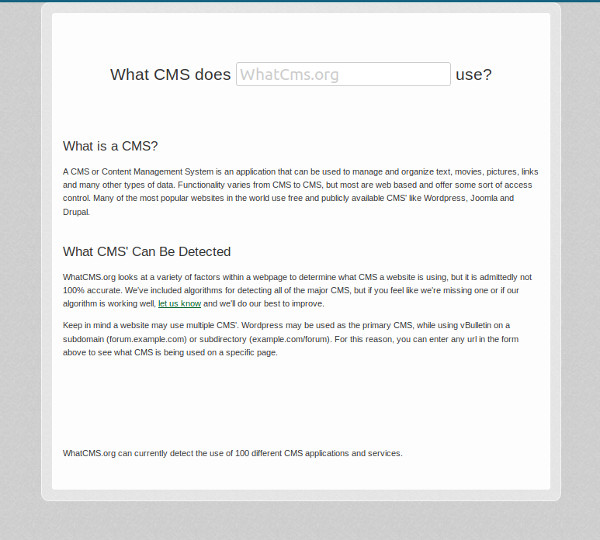About WhatCMS.org
WhatCMS.org handles requests from users around the world seeking to find out more about the websites they're using. There are hundreds of content management systems in use on the web with significantly different amounts of usage.
![]()
Detections
We strive to make our detection algorithm as accurate as possible and we're confident they're the most accurate detection algorithms in use. We have put in place a series of quality control systems to maintain accurate detections including:
- tracking detection confidence
- tracking detections where artifacts from multiple systems are found
One hallmark of our detection system is the ability to detect content management systems on a per-page basis instead of per-domain. For example, a blog page powered by Wordpress at example.com/blog does not tell us that the page at example.com is powered by Wordpress.
History
December 2011
A humble beginning, WhatCMS.org started the same way many projects start. A simple, single page website with a few paragraphs of text. Our detection algorithm was fairly simple and detected just the most popular systems. Here's what the site looked like:

January 2014
We expanded our detection algorithm and increased the number of systems we detect up to 100. Still a very simple site with a single page.
February 2016
Our next expansion brought us to 140 content management systems and we still just have a single page site.
May 2016
We began seeing increased usage and finally moved away from a single page site. We created a page for each CMS displaying the most popular sites that were detected for each CMS.
March 2017
Our homepage was enhanced to show recent searches and detections. We also increased the number of detected systems to 163.
May - September 2017
We stepped up our efforts to increase detection accuracy and added more systems bringing the total to 192.
September 2017
We unveiled our blog to better communicate change, new features and issues with our users.
October 2017
We introduced our first version of the API. The first version of our API allowed anyone to set up an account for free access to our detection algorithms.
November 2017
The limits of the free API were too low for many users and we introduced three additional API plans with higher limits.
November - December 2017
Additional push to increase detection accuracy and thoroughness brings the total number of systems to 260.
January 2018
We now detect 320 CMS applications and have added a bulk detection option for API users.
November 2018
Introduced advanced version detections. Initial support for Wordpress, Joomla and Drupal
Dedicated Content Management System Detection